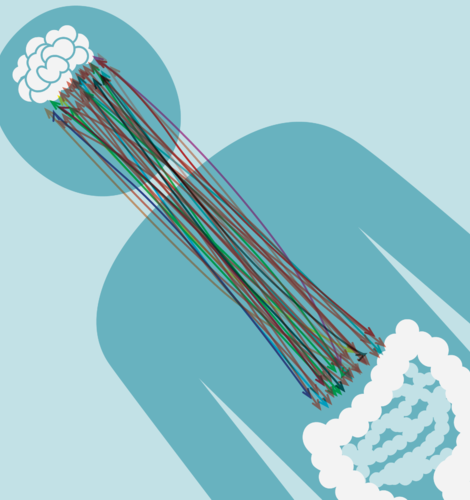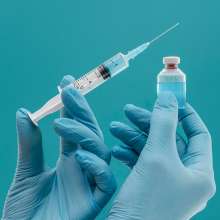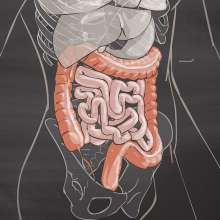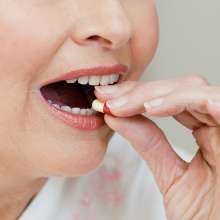Gut microbes affect brain functioning in many complex ways. It is, therefore, not surprising that dysfunction of the microbiota-gut-brain axis is linked to various psychiatric and neurodegenerative disorders.
Autism
Autism is characterized by social and communication impairment, and is often accompanied by behavioral symptoms, repetitive behaviors, gastroenterological disturbance, and immune dysfunction.
A series of studies on autism (autism spectrum disorder, ASD) indicated that gut microbiota dysbiosis (imbalance) might be associated with various aspects of the disorder.
For example, impaired social behaviors of germ-free mice were reversed after treatment with probiotics, or colonization with specific gut microbes.
Human studies have shown that both gut microbiota compositions and gut microbial production of short chain fatty acids (SCFAs, microbial signaling molecules that affects brain functions) were different in individuals with and without ASD.
Gut microbes Clostridium tetani have been associated with impaired social behaviors in animal studies. One study that treated ASD children with antibiotics targeting Clostridium reports reduced social impairment in these children.
Besides ASD, Alzheimer’s disease, Parkinson’s disease, addiction, schizophrenia, depression and anxiety are other neuropsychiatric and neurodegenerative conditions for which modulation of gut microbiota holds promising clinical applications.
Advance in research on how gut microbes influence these disorders were presented (studies listed below) at the Neuroscience 2017 Conference, annual conference of the Society for Neuroscience, held November 11-15 in Washington, DC, USA.
Society for Neuroscience is the largest international organization of scientists and physicians in the world devoted to understanding brain science and health.
Alzheimer’s Disease
- Gut infection and Alzheimer’s shared a gene?
A gene associated with risk for Alzheimer’s disease influences the gut microbiome of mice, potentially pointing to a new direction for treatment strategy, a study suggests.
The greatest genetic risk factor for Alzheimer’s disease is the APOE allele. Compared to people carrying the most common allele — APOE3 — those with APOE4 have an increased risk of Alzheimer’s disease, while APOE2 carriers have decreased risk.
APOE status may also influence the gastrointestinal system, but in the opposite way. Mice carrying APOE4 were better protected from parasitic stomach infection compared to APOE3 mice. In developing countries, APOE4 carriers had the best outcomes after childhood diarrheal diseases, while APOE2 carriers had the worst.
To determine whether APOE affects the gut microbiome, researchers examined mice expressing APOE2, APOE3, or APOE4 alleles. Sequencing DNA isolated from fecal samples revealed populations of bacteria living in the mice gut.
The bacterial populations varied significantly between mice expressing APOE2, APOE3, or APOE4 alleles. For example, bacteria from the Ruminococcaceae family were most abundant in APOE2 mice and the least abundant in APOE4 mice.
These results suggest that APOE alleles may affect the gut microbiome differently, which could contribute to the actions of APOE in modulating Alzheimer’s disease risk.
By identifying disease-associated bacterial populations, scientists can explore ways to alter the microbiome with probiotics or antibiotics, reducing the risk for Alzheimer.
- Probiotics reduce memory deficit in Alzheimer’s?
Taking probiotic to alter the species of gut bacteria may slow down the progression of Alzheimer’s disease, according to a new animal study.
Probiotics can change the composition of the gut microbiota, helping healthy species outnumber harmful bacteria. Previous research on rodents has shown that certain species of gut bacteria can accelerate the progress of Alzheimer’s, suggesting that changing the ratio of gut species may impact the disease.
Researchers in the latest study tested if probiotics may slow the disease progress. They fed mice with genetic mutation associated with Alzheimer’s and control mice with either a diet supplemented with a probiotic, or a regular diet for two months.
Alzheimer mice on regular diet displayed memory problems compared to control mice. But Alzheimer mice fed with probiotic diet had fewer memory problems. In addition, Alzheimer mice have leaky gut barrier compared to control mice. This was also corrected with the probiotic treatment.
Researchers suggest that gut bacteria imbalance can contribute to the pathological features associated with Alzheimer’s disease, and that probiotics can help slow down the Alzheimer’s disease progress.
Parkinson’s disease
- Parkinson’s-associated protein moves between brain and gut
Previous studies have shown that a toxic form of the protein alpha-synuclein spread from the gut to the brain, causing neuronal death and neurodegenerative symptoms in parkinson's disease such as shaking, rigidity, and trouble moving.
New study presented compared two groups of baboons injected with clumps of the toxic protein, one in the brain and the other in the stomach. Regardless of the site of injection, both groups developed neuronal death and alpha-synuclein pathology two years later, in both their brain and in their gut.
- Parkinson’s disease elevated gut inflammation
Changes in the levels of inflammation biomarkers in the gut may reveal the presence and progression of neurodegenerative diseases such as Parkinson’s disease, a study reports.
Researchers looked for signs of inflammation in the colon tissue of control rats and rats with Parkinson’s disease. All of the Parkinson’s rats show higher levels of inflammation biomarker CD68, compared to normal rats.
They suggest that inflammation in the lining of the gut may be indicative of inflammation in the brain. Timeline of progression in one may reveal development of the other.
- Can gut microbes help prevent neurodegenerative diseases?
Compounds produced by gut bacteria, called microbial metabolites, may block harmful protein misfolding characteristic of many neurodegenerative diseases such as Parkinson’s, a study suggests.
Many neurodegenerative diseases are thought to start with a misfolded protein, which acts as a seed, triggering other proteins to misfold and the disease to spread throughout the brain. Compounds that interfere with misfolding may prevent the aggregates from forming and halt the spread.
Researchers in a new study tested 6 gut-derived metabolites for their potential to block misfolding. They found that 3 of the metabolites inhibited the aggregation of alpha-synuclein in test tube experiments. When testing out the compounds with flies, they found that all six of the metabolites reduced degeneration in the fly model, with two almost completely preventing it.
Addiction
- Gut microbial imbalance contributes to drug addiction
A study reports that rats with gut microbiome depleted by antibiotics showed significantly more addiction-like behaviors, self-administering more cocaine.
Similarly, gut microbiome depleted rats also exhibited significantly higher relapse-like behaviors, working much harder than control rats to receive an infusion of cocaine.
Researchers suggest that modulation of gut microbiome may help decrease addiction behaviors.
Schizophrenia
- Gut microbes and brain linked in schizophrenia
Researchers report that gut microbial imbalances may trigger the activation of an immune gene that contributes genetic risk for schizophrenia, and that treatments to modulate gut microbiome may be beneficial in schizophrenia.
The immune gene, complement C4, was recently identified in a landmark study as a contributor of genetic risk for schizophrenia. A study now shows that an underlying cause of complement C4 activation may be gut microbial imbalance.
The researchers compared blood levels of biomarkers for microbial translocation due to leaky gut barrier, gut inflammation, and complement activation in schizophrenia and non-psychiatric individuals.
They find that gut inflammation is more prevalent in schizophrenia, and complement levels were elevated with increased gut microbial imbalance in people with schizophrenia.
Gut microbial imbalance, especially over-abundance of a certain type of Candida yeast, was associated with worse psychiatric symptoms and more cognitive impairments.
A smaller study of this schizophrenia cohort shows that probiotic use helped decreased microbial imbalance. Improvements of bowel function and psychiatric symptoms were most evident in schizophrenia individuals without the yeast imbalance.





